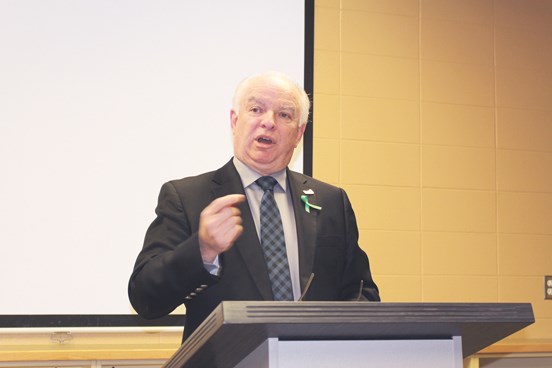The City of Yorkton is still seeing development and is in good financial health.
Those were two key messages given by Yorkton Mayor Bob Maloney during a ‘State of the Union’ address following the annual meeting of the Yorkton Chamber of Commerce.
The good financial situation relates both to the 2018 budget, and in terms of overall debt, offered Maloney.
In terms of the immediate budget, Maloney said the city is receiving $700,000 in additional funding over last year from the province. He said the money was forthcoming because of discussions with the province and replaces some of the funding lost in 2017 when the province cancelled grants in lieu to municipalities.
“Yorkton was the hardest hit [in 2017],” reminded Maloney, adding the $700,000 “covers some of what we lost in the 2017 budget.”
But that still means less dollars coming to the city.
“We will be short $1 million annually in terms of funding pre 2017 from the province”, said Maloney, noting that it will be a loss they are not likely to ever recoup.
Funding from the province remains sort of up-in-the-air, said the Mayor. He noted the province has stated it will be reviewing its revenue sharing with the municipalities.
“Our Council is concerned about that,” said Maloney, adding the 0.1 per cent of provincial sales tax has been a stable, and reliable source of funding.
Maloney also took the opportunity to give a broad overview of where the city spends its money. In broad terms 16.8 cents of every dollar goes to capital construction. Other costs include; 15.4 cents to public works, 6.8 to the Gallagher Centre, 10.4 to parks and recreation, 8.4 to fire protection, 14.3 to RCMP and 10.2 to administration and finance.
The average household in the city now pays $1827 annually in property tax, or $152 per month, said Maloney, suggesting that is about the same as a couple will pay if they each have a cellphone.
The Mayor also reminded “school taxes are set by the province,” adding the City only collects the school portion. “I don’t know why we collect millions of dollars for nothing, but we do.”
With the school portion included the average household pays $2644.
In comparing the dollars to that of other cities, something that is not always accurate because of home values and services provided, but Maloney noted Yorkton is on the lower end of the comparison.
“On the residential side of things Yorkton is doing quite well,” he said.
The tax dollars collected have largely been reinvested in the city, suggested Maloney. Pointing to the period 2014 to 2017, $12 million has gone into drainage projects, $5.3 in sewer and water, and $5.1 million in roads as examples.
“We still have a lot of drainage work to do,” said Maloney, but then added it is a decades old problem that cannot be fixed in a few years. He said the original design in term of handling rainwater was made to deal with one-inch of rainfall per hour.
This year the City will invest $30 million in capital projects, $5 million coming from the tax base, and the remainder coming from the reserves and self-sufficient utilities such as water and the landfill, explained Maloney, adding the work will necessitate $7 million in borrowing.
The work includes some $6.7 million for a new landfill cell, $2.7 million for a new Highway 9 bridge, $950,000 for the Highway 9 intersection, and $750,000 for a pedestrian bridge and pathways work.
The City is also beginning a two-year program to ‘shave and pave’ Broadway Street, said Maloney. He said Council is aware they are laying new top pavement over underground water and sewer infrastructure that is a century old.
A complete redo of the street was estimated at $50 million-plus, and with grant requests from federal/provincial programs turned down since 2014, “the only option is to ‘shave and pave’,” said Maloney.
Maloney said to borrow to do the complete $50 million project just is not reasonable.
“I don’t think financially it would work for our city,” he said.
Even with the additional borrowing the city will have a debt of about $15 million “well within the $42 million” allowed by the province, offered Maloney. He added, “I know some cities smaller than Yorkton with four times that (debt load).”
While the overall economy has slowed from its most robust years of 2014-16, growth continues, particularly on the business side, said Maloney.
Among the positives locally is a $100 million expansion at Grain Millers. While located in the neighbouring rural municipality, Maloney said most staff live in the city, and the company is a great corporate supporter for Yorkton.
Other businesses of note to open in 2017 included the regional hub for Pattison Ag, Save On Foods, and the CLAAS dealership.
As for the slowdown in the economy Maloney said it is a provincial thing with all cities seeing declines.
When the economy ramps up again, Yorkton is well-positioned with 81 residential lots available for sale, and 796 acres available for industrial development.




